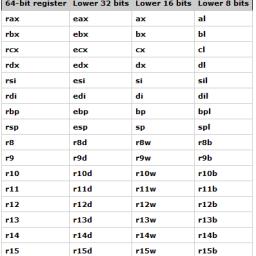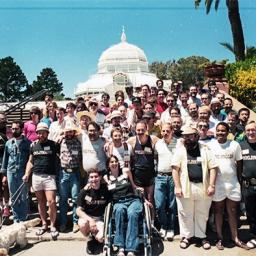
If you're interested in understanding how the 64 bit processor works by programming for it, have a look at the
"Code as Art" blog (0xax.blogspot.com), where a guy recounts his experiences learning to program in 64 bit assembly.
section .data
msg db "hello, world!"
section .text
global _start
_start:
mov rax, 1
mov rdi, 1
mov rsi, msg
mov rdx, 13
syscall
mov rax, 60
mov rdi, 0
syscall
So we know that sys_write syscall takes three arguments and has number one in syscall table. Let's look again to our hello world implementation. We put 1 to rax register, it means that we will use sys_write system call. In next line we put 1 to rdi register, it will be first argument of sys_write, 1 - standard output. Than we store pointer to msg at rsi register, it will be second buf argument for sys_write. And than we pass the last (third) parameter (length of string) to rdx, it will be third argument of sys_write. Now we have all arguments of sys_write and we can call it with syscall function at 11 line. Ok, we printed "Hello world" string, now need to do correctly exit from program. We pass 60 to rax register, 60 is a number of exit syscall. And pass also 0 to rdi register, it will be error code, so with 0 our program must exit successfully. That's all for "Hello world". Quite simple :)

Slate is running an interesting piece called
"The First Gay Space on the Internet". But it's only marginally about homosexuality; it's really a look at how people use the Internet to meet, exchange opinions, and discuss things of interest. And that makes it relevant even today.
Many newsgroups were purely informational, useful for technical discussions or sharing of news or jokes or porn. But soc.motss was genuinely a new kind of community, a diverse set of people who felt at home and most like themselves on the Net, and who had discussions there that they couldn't have anywhere else. Before Facebook preferred status updates to long posts and Twitter reduced the size of a rebuttal to 140 characters, soc.motss proved that online discourse was indeed compatible with open-mindedness, subtlety, and civility.
The article goes back to a time when bandwidth was limited and expensive, and people took a long time to compose and write down their thoughts before posting. It points out early newsreaders were unthreaded, so any newsgroup was bound to have more readers than contributors. The Internet has come a long way from then, but the long, written form is in decline, and quick, heat-of-the-moment posts or diatribes are more the norm.
If you agree, click the "like" button and then move on.
After many years of experimentation, Google has finally decided to
abandon its tracking of authorship. Authorship was potentially useful but a bit of a hassle to implement. First you had to create a Google profile, then somewhere, like in the footer of your blog or equivalent, you needed a hyperlink to that profile. Thirdly, in your Google profile, you had to provide a list of sites where you were an author. When you'd jumped through those hoops, you'd be rewarded with a little picture of yourself next to Google search results linked to your site.
About a year ago, they decided to reduce the number of results that showed an image to only the biggest guns or some, select searches. And now they've decided it wasn't providing much value at all, and have ditched it. From John Mueller's G+ post:
Unfortunately, we've also observed that this information isn't as useful to our users as we'd hoped, and can even distract from those results. With this in mind, we've made the difficult decision to stop showing authorship in search results.
(If you're curious -- in our tests, removing authorship generally does not seem to reduce traffic to sites. Nor does it increase clicks on ads. We make these kinds of changes to improve our users' experience.)
Sayonara, authorship! Webmasters had fun jumping through the endless hoops of clawing ourselves up the slope of Search Engine Optimization anyway!
 If you're interested in understanding how the 64 bit processor works by programming for it, have a look at the "Code as Art" blog (0xax.blogspot.com), where a guy recounts his experiences learning to program in 64 bit assembly.
If you're interested in understanding how the 64 bit processor works by programming for it, have a look at the "Code as Art" blog (0xax.blogspot.com), where a guy recounts his experiences learning to program in 64 bit assembly.